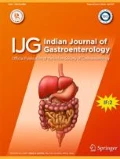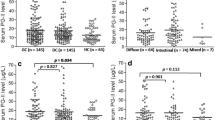Abstract
Aim
Helicobacter pylori infection, though common, leads to gastric cancer (GC) in less than 1% individuals, suggesting the role of host factors. We previously reported the role of glutathione–S–transferase (GST) polymorphisms, the gene encoding a carcinogen–detoxifying enzyme, in GC. This study was aimed to evaluate GST enzyme activity, GST polymorphism, glutathione (GSH) levels and H. pylori in patients with GC.
Methods
GST and GSH levels were estimated in gastric biopsies of 52 patients with GC, 37 functional dyspepsia (FD) and 39 peptic ulcer (PU), and correlated with H. pylori (ELISA) infection and GST polymorphisms. GST polymorphisms were separately analyzed in relationship to H. pylori in 82 GC, 72 FD, 53 PU and 89 healthy controls (HC).
Results
GST activity was lower in patients with GC in comparison to PU (p = 0.03), but GSH levels were comparable. GSTT1 null genotype (GSTT1*0) and simultaneous deletion of both GSTT1 and GSTM1 genes was associated with lower enzyme activity (p = 0.02 and 0.01, respectively). GST and GSH levels in H. pylori positive and negative patients with GC, FD and PU were comparable. Presence of H. pylori infection along with GSTT1*0 (p = 0.006) and GSTM1*0 (p = 0.05) was associated with lower enzyme activity. GSTT1*0 was associated with higher odds ratio (OR) of GC in presence of H. pylori (GC vs. HC: p = 0.02, OR 2.6 [95% CI = 1–6] vs. p = 0.7, 1.3 [0.4–5.0]; GC vs. PU: p = 0.04, OR 3 [95% CI = 1–9] vs. not applicable (OR could not be computed as frequency of GSTT1*0 in H. pylori negative patients with PU was zero)].
Conclusions
GC is associated with reduced GST activity. Odds ratio of GC associated with GSTT1*0 is enhanced in presence of H. pylori probably due to combined effect of both on enzyme activity.


Similar content being viewed by others
References
Correa P. Human gastric carcinogenesis: a multistep and multifactorial process-First American Cancer Society Award Lecture on cancer epidemiology and prevention. Cancer Res. 1992;52:6735–40.
International Agency for Research on Cancer. In: Liver flukes and helicobacter pylori. IARC monographs on the evaluation of carcinogenic risks to human no. 61. Lycon: IARC; 1994.
Graham DY, Adam E, Reddy GT, et al. Seroepidemiology of helicobacter pylori infection in India. Comparison of developing and developed countries. Dig Dis Sci. 1991;36:1084–8.
Parsonnet J, Friedman GD, Orentreich N, Vogelman H. Risk for gastric cancer in people with CagA positive or CagA negative helicobacter pylori infection. Gut. 1997;40:297–301.
Singh K, Ghoshal UC. Causal role of Helicobacter pylori in gastric cancer: an Asian enigma. World J Gastroenterol. 2006;12:1346–51.
Ghoshal UC, Tiwari S, Dhingra S, et al. Frequency of Helicobacter pylori and CagA antibody in patients with gastric neoplasms and controls: the Indian enigma. Dig Dis Sci. 2008;53:1215–22.
Ghoshal UC, Tripathi S, Ghoshal U. The Indian enigma of frequent H. pylori infection but infrequent gastric cancer: is the magic key in Indian diet, host’s genetic make up, or friendly bug? Am J Gastroenterol. 2007;102:2113–4.
González CA, Sala N, Capellá G. Genetic susceptibility and gastric cancer risk. Int J Cancer. 2002;100:249–60.
Dong LM, Potter JD, White E, Ulrich CM, Cardon LR, Peters U. Genetic susceptibility to cancer: the role of polymorphisms in candidate genes. JAMA. 2008;299:2423–36.
Gonzalez FJ. The role of carcinogen-metabolizing enzyme polymorphisms in cancer susceptibility. Reprod Toxicol. 1997;11:397–412.
Ketterer B. Protective role of glutathione and glutathione transferases in mutagenesis and carcinogenesis. Mutat Res. 1988;202:343–61.
Hayes JD, Pulford DJ. The glutathione S-transferase supergene family: regulation of GST and the contribution of the isoenzymes to cancer chemoprotection and drug resistance. Crit Rev Biochem Mol Biol. 1995;30:445–600.
Pemble S, Schroeder KR, Spencer SR, et al. Human glutathione S-transferase theta (GSTT1): cDNA cloning and the characterization of a genetic polymorphism. Biochem J. 1994;300(Pt 1):271–6.
Ali-Osman F, Akande O, Antoun G, Mao JX, Buolamwini J. Molecular cloning, characterization, and expression in Escherichia coli of full-length cDNAs of three human glutathione S-transferase Pi gene variants. Evidence for differential catalytic activity of the encoded proteins. J Biol Chem. 1997;272:10004–12.
Tripathi S, Ghoshal U, Ghoshal UC, et al. Gastric carcinogenesis: possible role of polymorphisms of GSTM1, GSTT1, and GSTP1 genes. Scand J Gastroenterol. 2008;43:431–9.
You WC, Hong JY, Zhang L, et al. Genetic polymorphisms of CYP2E1, GSTT1, GSTP1, GSTM1, ALDH2, and ODC and the risk of advanced precancerous gastric lesions in a Chinese population. Cancer Epidemiol Biomarkers Prev. 2005;14:451–8.
Colombo J, Rossit AR, Caetano A, Borim AA, Wornrath D, Silva AE. GSTT1, GSTM1 and CYP2E1 genetic polymorphisms in gastric cancer and chronic gastritis in a Brazilian population. World J Gastroenterol. 2004;10:1240–5.
Martinez C, Martín F, Fernández JM, et al. Glutathione S-transferases mu 1, theta 1, pi 1, alpha 1 and mu 3 genetic polymorphisms and the risk of colorectal and gastric cancers in humans. Pharmacogenomics. 2006;7:711–8.
Tamer LA, Ateş NA, Ateş C, et al. Glutathione S-transferase M1, T1 and P1 genetic polymorphisms, cigarette smoking and gastric cancer risk. Cell Biochem Funct. 2005;23:267–72.
Verhulst ML, van Oijen AH, Roelofs HM, Peters WH, Jansen JB. Antral glutathione concentration and glutathione S-transferase activity in patients with and without Helicobacter pylori. Dig Dis Sci. 2000;45:629–32.
Beil W, Obst B, Sewing KF, Wagner S. Helicobacter pylori reduces intracellular glutathione in gastric epithelial cells. Dig Dis Sci. 2000;45:1769–73.
Habig WH, Pabst MJ, Jakoby WB. Glutathione S-transferases. The first enzymatic step in mercapturic acid formation. J Biol Chem. 1974;249:7130–9.
Peters WH, Roelofs HM, Hectors MP, Nagengast FM, Jansen JB. Glutathione and glutathione S-transferases in Barrett’s epithelium. Br J Cancer. 1993;67:1413–7.
Oijen AH, Verhulst ML, Roelofs HM, Peters WH, de Boer WA, Jansen JB. Eradication of Helicobacter pylori restores glutathione S-transferase activity and glutathione levels in antral mucosa. Jpn J Cancer Res. 2001;92:1329–34.
Hoensch H, Morgenstern I, Petereit G, Siepmann M, Peters WH, Roelofs HM, et al. Influence of clinical factors, diet, and drugs on the human upper gastrointestinal glutathione system. Gut. 2002;50:235–40.
Acknowledgements
Authors thank Department of Science and Technology, India for providing financial support for the project to UG (DST letter no: SR/FT/L-17/2003) for the work. ST acknowledges the financial support from the University Grants Commission, India.
Author information
Authors and Affiliations
Corresponding author
Rights and permissions
About this article
Cite this article
Tripathi, S., Ghoshal, U., Mittal, B. et al. Association between gastric mucosal glutathione-S-transferase activity, glutathione-S-transferase gene polymorphisms and Helicobacter pylori infection in gastric cancer. Indian J Gastroenterol 30, 257–263 (2011). https://doi.org/10.1007/s12664-011-0144-2
Received:
Accepted:
Published:
Issue Date:
DOI: https://doi.org/10.1007/s12664-011-0144-2




